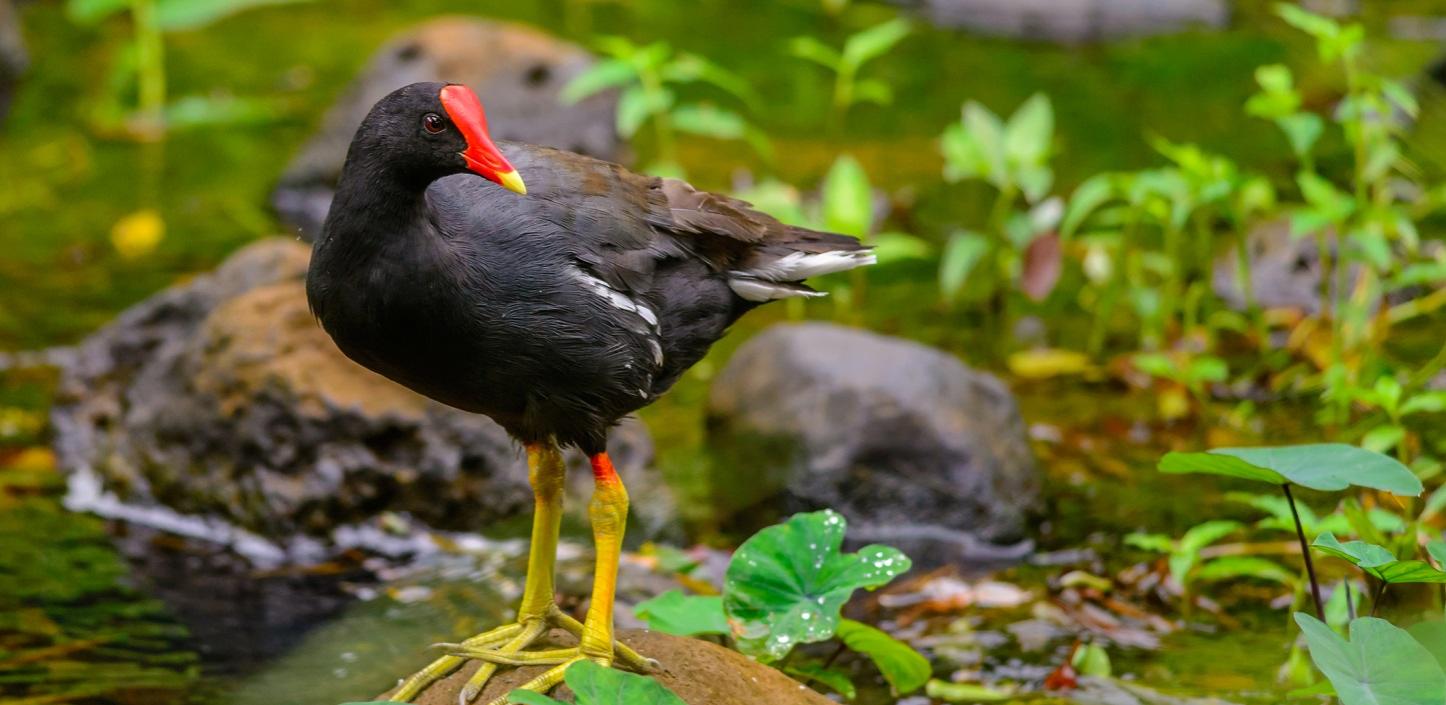
NFWF’s Hawai'i Conservation Program Announces More Than $530,000 in New Grants
Projects will support native bird conservation and engage local citizens in restoration activities
HONOLULU, HAWAI'I (April 26, 2022) – The National Fish and Wildlife Foundation (NFWF) today announced $530,600 in grants to promote endemic bird conservation and community participation in Hawai'i. The six grants will generate $562,200 in matching contributions for a total conservation impact of $1,092,800.
The grants were awarded through the Hawai'i Conservation Program, a partnership between NFWF, the U.S. Fish and Wildlife Service (USFWS), the U.S. Forest Service (USFS) and Pūlama Lāna'i.
“Hawai'i is home to a number of native species of plants and wildlife found nowhere else in the world,” said Jeff Trandahl, executive director and CEO of NFWF. “Unfortunately, degraded habitat conditions are threatening the very survival of these unique and culturally significant species. The six grants we announce today directly address the goals of the recently released Hawai'i Conservation Program business plan. These goals include the protection of a suite of native bird species and coral reef tracts, and the restoration of watershed forest health throughout the islands.”
Grants focusing on bird conservation will remove invasive plants and replace them with endemic plants in critical 'ua'u (Hawaiian petrel) and palila (finch-billed Hawaiian honeycreeper) habitats. Grants will also conduct predator control for O'ahu elepaio (monarch flycatcher) and native forest birds on Kaua'i.
In support of developing an effective landscape-level avian malaria control strategy, grants will fill information gaps on the presence, distribution, abundance and seasonality of kiwikiu (Maui parrotbill) and avian malaria-carrying mosquitoes. Projects will also support the establishment of a new population of 'alalā (Hawaiian crow) in Maui Nui and conduct a reintroduction feasibility study for 'alae 'ula (Hawaiian moorhen) on a third Hawaiian island.
“Partnership is essential for recovery threatened and endangered species in Hawai'i,” said Michelle Bogardus, assistant field supervisor, Pacific Islands Fish and Wildlife Office, U.S. Fish and Wildlife Service. “Working with partners to fund conservation projects like these is an essential part of preventing the extinction of the almost 500 Hawaiian species listed as threatened and endangered under the Endangered Species Act.”
Additionally, grants will incorporate community outreach and foster community engagement. On Lāna'i, grantee Pono Pacific Land Management will host volunteer events with the local community focused on improving nesting native habitat for 'ua'u by conducting native seed collection, propagation and outplanting.
“It is critical that we continue focusing conservation efforts on this windward section of Lānaʻi. In doing so we are protecting the native ʻuaʻu, we are also allowing the native forest to return and protect our near shore reefs,” said Kurt Matsumoto, president of Pūlama Lānaʻi. “We are grateful for the opportunity to partner with NFWF on this landmark restoration project, now in its third year, to accelerate the progress already being made to protect our native seabirds and the endemic plants surrounding their habitat.”
Established in 2021, NFWF’s business plan for the Hawai'i Conservation Program outlines the goals and strategies to restore, improve and protect habitat and wildlife throughout the main Hawaiian Islands, from mauka to makai (from the mountains to the ocean), to reduce extinction risk and sustain resilient populations of native species. Under the new business plan, the Hawai'i Conservation Program has supported 27 projects totaling $6.5 million in grants that leveraged more than $6.8 million in grantee matching contributions for a total on-the-ground conservation impact of more than $13.3 million.
A complete list of the 2022 grants made through this program is available here.
About the National Fish and Wildlife Foundation
Chartered by Congress in 1984, the National Fish and Wildlife Foundation (NFWF) protects and restores the nation’s fish, wildlife, plants and habitats. Working with federal, corporate and individual partners, NFWF has funded more than 6,000 organizations and generated a conservation impact of $7.4 billion. Learn more at www.nfwf.org.
About the U.S. Fish and Wildlife Service
The mission of the U.S. Fish and Wildlife Service is working with others to conserve, protect, and enhance fish, wildlife, plants, and their habitats for the continuing benefit of the American people. We are both a leader and trusted partner in fish and wildlife conservation, known for our scientific excellence, stewardship of lands and natural resources, dedicated professionals, and commitment to public service. For more information on our work and the people who make it happen, visit www.fws.gov.
About the U.S. Forest Service
Established in 1905, the Forest Service’s mission is to sustain the health, diversity, and productivity of the nation’s forests and grasslands to meet the needs of present and future generations. The agency manages 193 million acres of public land, provides assistance to state and private landowners, and maintains one of the largest forestry research organizations in the world. Public lands managed by the Forest Service provide 20 percent of the nation’s clean water supply and contribute more than $13 billion to the economy each year through visitor spending alone. The agency also supports sustainable management on about 500 million acres of private, state and tribal forests including forests in urban areas. For more information, visit www.fs.usda.gov.
About Pūlama Lāna‘i
Pūlama Lāna‘i is committed to redefining the Hawaiian Island of Lāna‘i as a sustainable community by creating new opportunities driven by agriculture, resource management, conservation and more. Enhancing and perpetuating the island’s diverse species and fragile ecosystem through game management, natural species preservation, watershed management, erosion control, coastal resources and fisheries management, invasive species control and conservation education, Pūlama Lāna‘i brings an integrated and comprehensive approach to protect and manage Lāna‘i’s natural resources to preserve Hawaiian culture and improve the lives of Lāna‘i residents.
###
Contact:
Rob Blumenthal, 202-857-0166, rob.blumenthal@nfwf.org